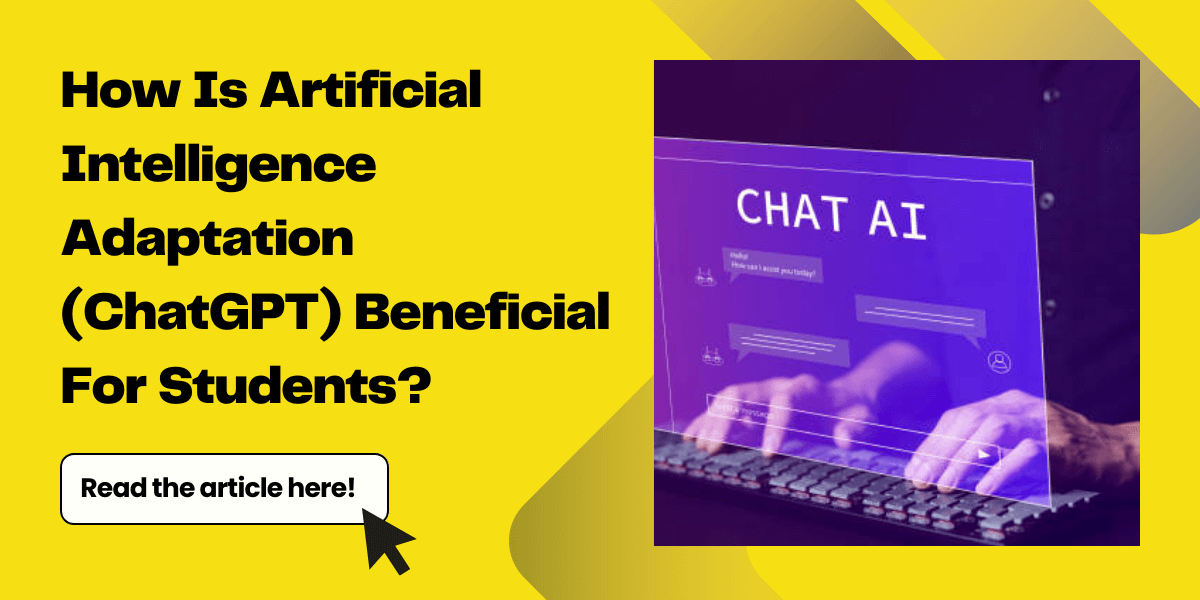How Is Artificial Intelligence Adaptation (ChatGPT) Beneficial For Students?
August 07, 2023
Anis

On November 30th, 2022, ChatGPT, an AI-powered assistant, was launched and quickly became a popular breakthrough on social media.
Users of all ages were intrigued by its potential benefits, not just for university students but also for high schoolers.
As with any new technology, people had questions about ChatGPT's capabilities.
Some wondered if it could find answers or do coding, while others asked if it could provide academic essays.
It is important to note that AI technology is still in its early stages and has room for improvement.
Even though ChatGPT is an accommodating assistant, some users express their concerns that it could contribute to plagiarism in the academic world.
To address this, educators should establish guidelines to help students use AI tools ethically and responsibly.
This issue has become a topic of discussion in Malaysia.
How Does Malaysia Perceive The Usage Of ChatGPT?

Image source: iStock
The Minister of Higher Education in Malaysia, Datuk Seri Mohamed Khaled Nordin, announced in June of 2023 that university students would not be prohibited from using ChatGPT.
This decision was made due to the increasing prevalence of the technology.
The Minister acknowledged that ChatGPT is already being used by many students in local universities.
To ensure safe and fair use, the Department of Higher Education has issued guidelines to local universities on how ChatGPT can be used in appropriate situations.
The guidelines have been distributed, reflecting Malaysia's careful and progressive approach to incorporating AI technology into higher education.
This move will help students to utilize ChatGPT effectively and responsibly.
How AI Tools (ChatGPT) Support the Education Sector?
There has been some debate among educators regarding ChatGPT, an AI-powered chatbot that students are using for their studies.
This tool is capable of writing assignments, solving math and science problems, and even providing coding assistance to make life easier for students.
While some educators are concerned about the potential misuse of the tool, others have found it to be a helpful resource for providing detailed feedback on student work.
On the other hand, it's important to note that cheating with AI tools such as ChatGPT can have negative consequences, as it may lead to incorrect or misleading answers.
Overall, the existence and capabilities of ChatGPT have been surprising to some educators, who are still figuring out how to use the tool best for their students' benefit.
However, AI can offer constructive feedback to help students improve their academic performance.
As such, there is potential for AI tools to be a valuable tool for educators and students alike.
6 Benefits Of AI Tools (ChatGPT)
AI tools offer teachers a multitude of ways to adapt to their usage. Here are several examples:
1. Enhance class lessons
In low- and middle-income countries (LMICs), teachers often face the challenge of making a heavy curriculum interesting for their students.
ChatGPT offers a solution to this problem by giving teachers the tools to turn their learning objectives into captivating lesson plans.
Other than that, the teachers can discover fresh ideas for class preparation, and create innovative assignments and assessments.
Nonetheless, it's crucial to keep in mind that while ChatGPT can help with lesson planning and proficiency, teachers must possess pedagogical expertise to deliver exceptional lessons.
2. Create assessment questions
ChatGPT presents a remarkable opportunity for teachers to elevate their assessment methods and design comprehensive multiple-choice items.
This cutting-edge tool also enables them to inspire their students to cultivate higher-order thinking abilities while tackling essay questions and real-world challenges.
By incorporating diverse assessments, they can help their learners advance their critical thinking, problem-solving, and teamwork skills, thus preparing them for a successful future.
3. Lessen language barrier issue

Image source: iStock
In some educational systems, adopting a second language, such as English, is becoming more common as the primary language of instruction.
However, this can pose a challenge for teachers who need to be more fluent in the language.
To help these teachers teach more effectively, a chatbot could be a valuable resource to enhance their language skills.
Online language learning platforms like ChatGPT app offer affordable and personalized language lessons that could be highly beneficial.
While it's generally preferable for teachers to instruct in their native language, utilizing a chatbot to enhance language skills can help ensure that students receive the best education possible.
4. Offer supplementary assistance to students
ChatGPT can be a helpful resource for teachers to encourage their students' curiosity and inspire them to come up with new ideas for their homework.
However, it's essential to keep in mind that there is a risk that students may become reliant on ChatGPT to complete their assignments.
To address this issue, teachers should discuss with their students the limitations of AI-powered tools, including potential privacy risks, bias, and inaccuracies.
To ensure that students develop critical thinking skills and don't rely solely on ChatGPT, teachers should also ask questions that require specialized knowledge beyond the chatbot's training data.
It includes questions that need subjective perspectives or an understanding of human emotions.
By doing so, teachers can help students learn how to think critically and develop their unique perspectives, which will serve them well in their academic pursuits and life in general.
5. Papers and assessments grading

Image source: iStock
ChatGPT is an innovative tool that can help teachers analyze and differentiate student learning levels by automatically grading multiple-choice/one-answer tests.
It also assists with standards-based grading, providing educators with a comprehensive dataset.
However, it's essential to be aware of potential unintended consequences such as inaccurate grading, low accuracy, or false positive proctoring.
Therefore, it's necessary to prioritize fairness, accountability, confidentiality, and transparency when selecting grading or proctoring systems to ensure the reliability of their algorithms.
6. Helpful tutor to the students
Using ChatGPT, educators can provide personalized online tutoring to their students, ensuring that each student receives a tailored learning experience that meets their unique needs.
It is especially beneficial in cases where teachers must manage many students.
However, it is important to note that this technology is still in the early stages of development and must be carefully monitored.
Unsupervised use of tutoring services can be risky for students, as ChatGPT may generate inaccurate information or lead to inappropriate conversations.
Teachers can use ChatGPT to provide online tutoring services to students.
This could give students an adaptive learning assistant "for free" by adjusting to the learning needs of the students.
Especially in contexts where teachers are responsible for many students and don't have the bandwidth to tailor their instruction to each student's needs.
ChatGPT is still an early technology; gathering more evidence and requiring proactive supervision at scale is important.
Non-supervised tutoring risks unintentionally harming students, as ChatGPT can not only "make stuff up" but can also lead to disturbing conversations.
Using Artificial Intelligence, such as ChatGPT, in education is a big step toward improving how students learn, and teachers teach.
This integration offers personalized learning experiences, information access, continuous growth and development,, teacher support, and creativity and critical thinking.
As AI technology advances, its impact on education will increase tremendously.
Accepting the potential of AI can pave the way for a more inclusive and engaging future of education.
It can also empower learners to reach their maximum potential and prepare them for future challenges.
By creating a cooperative environment between AI and educators,they can help shape a brighter future for education using artificial intelligence.
Kickstart your education in Malaysia
We'll help you find and apply for your dream university
You might be interested in...
- EdUHK Wins Grand Prize at iCAN 2024 Achieves the Best Performance among Hong Kong Universities
- Sunway University Ranked Malaysia's No. 1 Private University in 2025
- A Sunway University Student's Journey from Cerebral Palsy to Graduation
- APU Dominates the 2024 Private Education Excellence Awards with Dual Wins
- The Young & the Wired: How Youth are Redefining the Digital Era?
- Promoting Inclusivity at Malaysian Universities: Tips for Malaysian and International Students
- Taking IELTS test in Malaysia: Tips, Tricks, and Key Info
- Sunway University Tops Times Higher (THE) Rankings in Malaysia
- Discovering Academic Opportunities and Pathways at APU after SPM and IGCSE
- Asia Pacific University's (APU) Innovative Initiatives Prepare Students for Industry 4.0
 +60142521561
+60142521561





